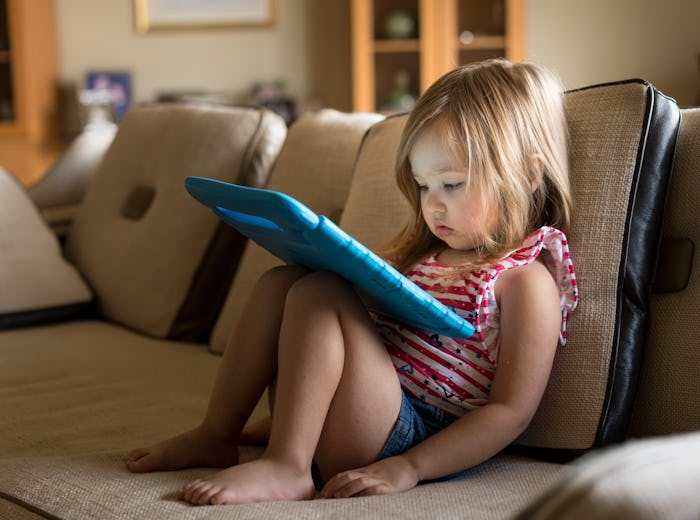Life

Here's How Swearing Off Screen Time Impacts Your Kids Later, According To Experts
It's true that the best of parenting intentions start with absolute statements. I will never be that parent in the grocery store with a screaming child. I will always enjoy time with my child. Cue tantrum in aisle 13 and you praying for bedtime to come soon. Parenting is tough and sometimes it requires a little help, whether it's in the form of a pal who babysits or Dora the Explorer. But how do you strike a balance? And is it bad to eliminate television or electronics entirely? Here's how no screen time affects your kids later, according to experts.
"I’m all about helping parents reduce the stress and anxiety of parenting and so I say, 'no screen time is a no-no!'" Susan G. Groner, who is known as "The Parenting Mentor," tells Romper in an email interview. "Taking smart phones, iPads, laptops, TV, and so forth completely off the table will cause so much stress to you, as a parent."
Groner, who is also the author of Parenting: 101 Ways to Rock Your World, adds that screen time may be your only (and best) option when you need a little break, or you have a deadline or important phone call, or simply need to get a shower. But it's important to set clear limits when — and how much — screen time is permitted, as well as the type of medium that is permissible, something that changes depending on your child's age. "When you have clear limits, guidelines, and/or rules, then there should be no negotiating," she says.
Groner says she adheres to an 80/20 rule, meaning that 20 percent of the time she allows screens. But she encourages each family to decide on a balance that works for them. "We all need a little chill time, down time, connect time, watch Peppa Pig time," she says.
According to a recent study in Psychiatric Quarterly, researcher Christopher J. Ferguson found that there is only a negligibly small association between excessive screen time and higher levels of depression and delinquency among teenagers. Ferguson even went as far to say that "the strict attention to limited screen time by policy makers and advocacy groups is uncalled for."
But according to the American Academy of Pediatrics (AAP), screen time for children ages 2 to 5 years should be limited to one hour per day for high-quality programs. Parents should watch shows and movies with children, and explain to them various concepts throughout. The AAP says children younger than 18 months should avoid screen time altogether.
"Screen time is a highly self-directed task that does not involve interaction," Molly Dresner, a certified speech and language pathologist and author of The Speech Teacher’s Handbook, tells Romper in an email interview. "Children become hyper-focused on the device when they are engaged in screen time and will tune out the world around them." Dresner says studies show a significant correlation between increased screen time and a higher risk of expressive language delay. "Screens also interfere with sleep routines, daily activities, and children’s level of engagement with other, more age-appropriate toys," she says.
So, how do you strike a balance then? Dresner says it is best to introduce screens only after children can use language spontaneously. "Once your child is able to use words in order to communicate wants and needs throughout the day and socially engage with others, then it is OK to introduce high-quality screen time," she says, adding that the best type of screen time is co-viewing or participating together so you provide the language to help your child understand the experience. Dresner also recommends setting a timer in order to signify to a child their viewing time is up.
The truth is, screens aren't going anywhere. But with a little bit of guidance you can find what works for you. Oh, and ignore screen shaming because if you've learned anything, it's that always and never finding a way of haunting you, am I right?
Check out Romper's new video series, Romper's Doula Diaries:
Watch full episodes of Romper's Doula Diaries on Facebook Watch.